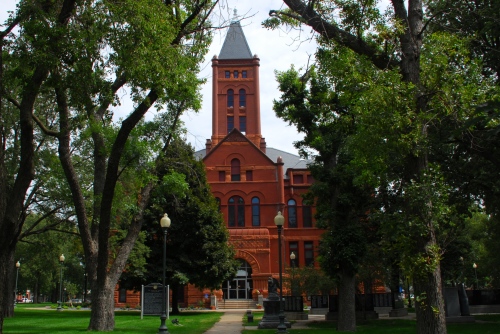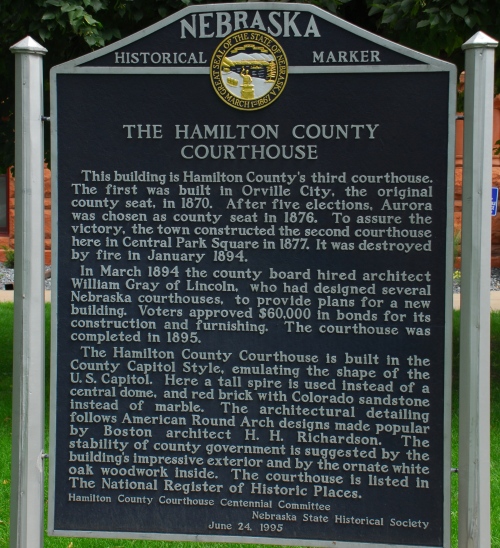One of my favorite courthouses so far is the courthouse in Aurora Nebraska.
It has a stunning presence in the center of town, the architecture is classic.
On June 4, 1923 the US Supreme court ruled in favor of Robert T. Meyer, who had been convicted here in Aurora of teaching German in a private school, and had invoked the 14th amendment.
Louis D. Brandeis, Pierce Butler, Oliver Wendell Holmes, Joseph McKenna, James Clark McReynolds (writing for the Court), Edward Terry Sanford, George Sutherland, William Howard Taft, Willis Van Devanter were the justices at the time.
Significance
For the first time, the Supreme Court hinted that the right to privacy was implied in the Due Process Clause of the Fourteenth Amendment. Although this case dealt with Meyer’s right to teach German, and parents’ rights to have their children learn the language, Meyer was later used as a precedent to uphold contraceptive and abortion rights.
During and after World War I, a wave of “100 percent Americanism” swept the United States. Immigrants, especially Germans, were looked at with suspicion,and businesses and civic groups promoted the teaching of English and American values. Sauerkraut was renamed “liberty cabbage,” and in Nebraska, angry citizens burned books written in German. In the context of that patriotic fervor, the state of Nebraska passed the Foreign Language Statute. The 1919 law prohibited an instructor from using a modern foreign language or teaching a foreign language to students in grades one through eight. Any teacher violating the law was subject to a fine or jail term of not more than 30 days.
Robert Meyer was a teacher in Hamilton County, at the Lutheran Zion Parochial School. In his class, Meyer used a collection of Bible stories written in German to teach reading to ten-year olds. The state found out and charged him on 25 May 1920, for violating the language law. Meyer was convictedin the district court of Hamilton. He then appealed to the Nebraska Supreme Court, claiming his right to teach had been denied, a right guaranteed under the Due Process Clause of the Fourteenth Amendment.
The Nebraska court ruled that Meyer violated the statute. They ruled that the law was a valid exercise of the state’s police power, and it did not infringe on Meyer’s Fourteenth Amendment rights. In its decision, the court reflected the anti-immigrant feelings of the time:
The salutary purpose of the statute is clear. The legislature has seen the baneful effects of permitting foreigners who had taken residence in this country, to rear and educate their children in the language of their native land. The result of that condition was found to be inimical to our own safety. To allow the children of foreigners who had emigrated here, to be taught from early childhood in the language of the country of their parents, was to rear them with that language as their mother tongue . . . The obvious purpose of this statute was that the English language should be and become the mother tongue of all children reared in this state.
From Language to Personal Liberty
The Supreme Court heard Meyer’s case on 23 February, 1923. In a 7-2 decision,the Court overturned the Nebraska court’s affirmation of the verdict. For the Court, Justice McReynolds noted that Meyer taught German as part of his occupation. Under the Fourteenth Amendment, Meyer had a right to work as a teacher, and the parents of his students had the right to have their children taught using German. The justice also pointed out that the state’s exercise of its police power was subject to judicial review.
In this case, the Court believed the state of Nebraska had infringed on personal liberty, even if the intent of the language law had a desirable end: ensuring all children learned English. The Constitution, McReynolds added, protected everyone, even people who speak a foreign language, and the laudable goal of promoting English “cannot be promoted by prohibited means.”
The decision had the immediate effect of restricting a state’s ability to control completely the curriculum taught in a private school. But Meyer‘s broader significance came from the reasoning McReynolds used to support the Court’s verdict. McReynolds wrote that the Court had not specifically spelled out the liberty guaranteed under the Fourteenth Amendment, and he started to do so:
Without doubt, it [liberty] denotes not merely freedom from bodily restraint, but also the right of the individual to contract, to engage in any of the common occupations of life, to acquire useful knowledge, to marry, to establish a home and bring up children, to worship God according to the dictates of his own conscience, and, generally, to enjoy those privileges long recognized at common law as essential to the orderly pursuit of happiness by free men . . . The established doctrine is that this liberty may not be interfered with, under the guise of protecting the public, by legislative action which is arbitrary or without reasonable relationship to some purpose within the competency of the state to effect.
Greater Impact for the Future
In the words of the Oxford Companion to the Supreme Court, the Meyer decision “languished in doctrinal obscurity for forty years.” But starting in the 1960s, the decision’s notion of protected personal liberty helped shape the idea of a right to privacy. The Court held that the right to privacy was implied in the Fourteenth Amendment and in McReynolds’ assertion that marriage, child-rearing, and other personal pursuits were fundamental, guaranteed liberties under that amendment. In Griswold v. Connecticut (1965), the Court said privacy rights allowed a married couple to use contraception without government interference. In another landmark case, Roe v. Wade (1973), Justice Harry Blackmun again cited the Meyer decision and the protection it extended to personal, private liberty. A woman’s right to privacy, Roe held, allows her to have an abortion if she chooses.
Imagine that Roe v. Wade had it’s roots here!
I can see Mr Meyer sitting in this chair in the basement. If he had only known!




